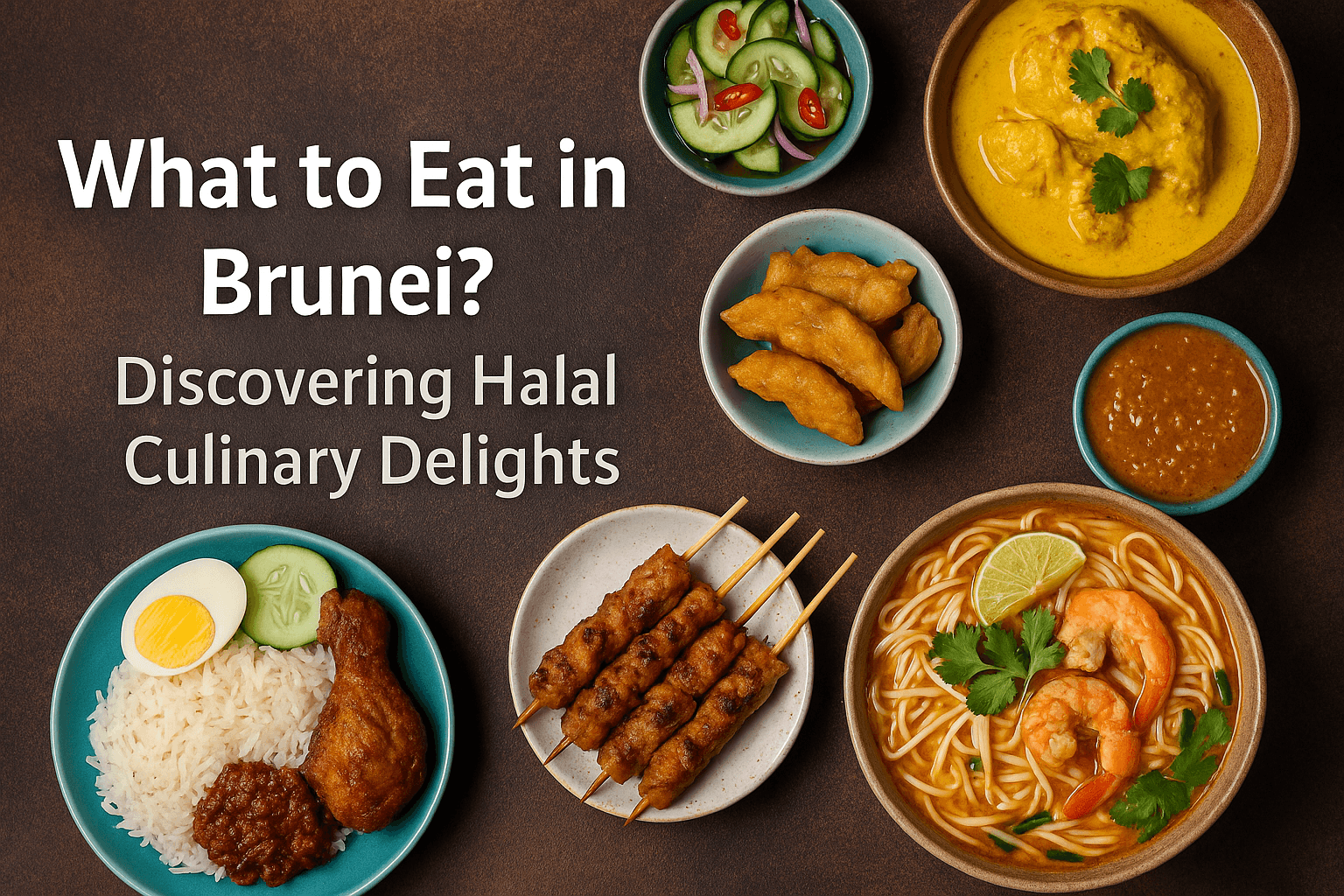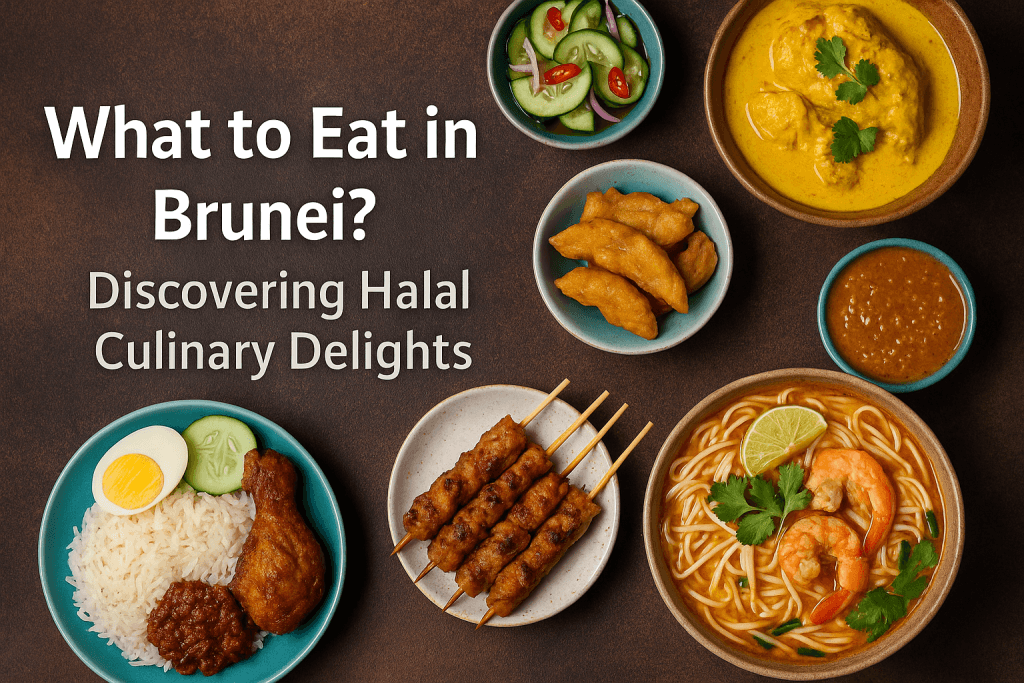Food is at the heart of every culture, and in Brunei, the cuisine reflects centuries of Islamic tradition, Malay heritage, and global influences that arrived through trade and cultural exchange. Asking What to Eat in Brunei? Discovering Halal Culinary Delights opens the door to an adventure filled with rich flavors, fragrant spices, fresh seafood, and wholesome meals. Every dish tells a story of faith, hospitality, and identity. The nation’s halal commitment ensures that travelers and locals alike can enjoy dining experiences that align with cultural and religious values.
This article will guide you through a complete culinary exploration of Brunei. From street food stalls and local markets to fine dining establishments and traditional family recipes, you will learn about iconic dishes, ingredients, and customs that shape the food scene of this small yet culturally vibrant country.

The Foundations of Brunei Cuisine
Halal as a Culinary Principle
The foundation of food in Brunei rests on the concept of halal. All food and beverages adhere strictly to Islamic dietary guidelines. This not only establishes trust but also creates a dining landscape where Muslim and non-Muslim visitors can enjoy authentic flavors with peace of mind. When you think about What to Eat in Brunei? Discovering Halal Culinary Delights, the assurance of halal authenticity is always part of the experience.
Malay Heritage and Global Influences
Brunei’s cuisine draws heavily from Malay traditions. However, it also incorporates flavors from neighboring Malaysia, Indonesia, and the Philippines, as well as Chinese, Indian, and Middle Eastern culinary traditions. This creates a fascinating blend of textures and flavors that make Brunei unique.
Staples like rice, noodles, fish, and coconut milk form the base of many meals. Layered onto these are spices like turmeric, lemongrass, chili, and ginger. Sweet dishes often feature pandan, palm sugar, and tropical fruits.
Breakfast in Brunei: A Flavorful Start
Nasi Katok – The Simple Favorite
One cannot talk about What to Eat in Brunei? Discovering Halal Culinary Delights without mentioning nasi katok. This iconic breakfast dish combines rice, fried chicken, and sambal chili. Despite its simplicity, it holds a special place in the hearts of locals.
Roti and Teh Tarik – Indian Influence
The Indian Muslim community in Brunei introduced roti canai and teh tarik, which are now staples of the local breakfast scene. Roti is often served with dhal curry, while teh tarik, or pulled tea, offers a frothy, sweet start to the day.
Ambuyat for the Adventurous
Though more commonly served at lunch or dinner, some Bruneians enjoy ambuyat in the morning. Made from sago starch, ambuyat has a sticky texture and is eaten with a bamboo fork called a candas. It pairs with sour sauces and fish dishes, making it a symbol of cultural pride.
Street Food and Market Delights
Gadong Night Market – A Culinary Wonderland
The Gadong Night Market is one of the best places to explore What to Eat in Brunei? Discovering Halal Culinary Delights. Stalls offer grilled satay, fried noodles, banana fritters, and refreshing sugarcane juice.
Satay – Skewered Perfection
Satay is a favorite across Southeast Asia, and in Brunei, it is enjoyed with peanut sauce and rice cakes. The halal preparation ensures the meat is marinated and grilled in line with Islamic practices.
Kuih – Traditional Snacks
Bruneian kuih are colorful bite-sized snacks made from rice flour, coconut, and palm sugar. Popular varieties include kuih lapis (layered cake) and seri muka (glutinous rice with custard topping). These treats embody the sweet side of What to Eat in Brunei? Discovering Halal Culinary Delights.
Signature Dishes of Brunei
Ambuyat – The National Dish
Ambuyat represents Brunei’s culinary identity. Its unique preparation and communal way of eating make it more than food; it is a cultural ritual. Eating ambuyat involves dipping the sticky starch into sauces like cacah binjai (mango dip) or sour chili sambal.
Ayam Kurma – Spiced Chicken
Ayam kurma is a dish made with chicken, yogurt, and mild spices. It reflects Indian influence while maintaining a distinct Bruneian flavor profile.
Beef Rendang – Rich and Aromatic
Although rendang originated in Indonesia, Brunei has adopted and adapted it. The slow-cooked beef, infused with coconut milk and spices, melts in your mouth and adds depth to What to Eat in Brunei? Discovering Halal Culinary Delights.
Seafood Excellence
Ikan Bakar – Grilled Fish
Brunei’s coastal geography ensures abundant seafood. Ikan bakar, or grilled fish, is often marinated with turmeric and served with sambal belacan.
Udang Galah – Giant Prawns
Giant freshwater prawns, known as udang galah, are a luxury ingredient found in rivers and mangroves. Cooked in curries or grilled, they represent the premium side of Bruneian cuisine.
Kerabu Seafood Salad
A refreshing dish combining seafood, lime juice, chili, and herbs, kerabu showcases the freshness of Brunei’s marine resources.
Rice and Noodle Specialties
Nasi Lemak – Fragrant Coconut Rice
Though associated with Malaysia, nasi lemak is widely enjoyed in Brunei. Coconut rice, anchovies, peanuts, and sambal create a balanced, flavorful meal.
Mee Goreng – Stir-Fried Noodles
Mee goreng is a versatile noodle dish flavored with soy sauce, garlic, and vegetables. Often topped with fried egg, it reflects the Chinese culinary influence within Brunei.
Laksa – Spicy Coconut Soup
Brunei’s laksa combines rice noodles with a coconut-based broth, shrimp, and bean sprouts. This dish is warming and deeply satisfying.
Desserts and Sweet Treats
Cendol – A Cooling Favorite
Cendol, made with shaved ice, coconut milk, pandan jelly, and palm sugar syrup, is a refreshing dessert often enjoyed in hot weather.
Pisang Goreng – Fried Banana
Pisang goreng is a simple yet beloved snack. The crispy fried banana is often served with condensed milk or eaten plain.
Tapai – Fermented Rice Dessert
Tapai showcases Brunei’s use of fermentation. Sweet and slightly tangy, it is wrapped in banana leaves for added aroma.
Drinks and Beverages
Teh Tarik and Kopi O
Teh tarik remains the most popular tea, while kopi o (black coffee) is favored by those who prefer a stronger taste.
Air Bandung
A sweet drink made from rose syrup and milk, air bandung is a festive beverage often served at gatherings.
Coconut Water
Fresh coconut water provides natural hydration and complements the tropical flavors of What to Eat in Brunei? Discovering Halal Culinary Delights.
Dining Culture and Etiquette
Eating with Hands
In many traditional households, eating with hands, particularly the right hand, is customary. Ambuyat, for example, is rarely eaten with modern utensils.
Sharing Meals
Communal dining emphasizes togetherness and respect. Meals are often served family-style, reinforcing the social aspect of eating.
Respect for Halal Guidelines
Visitors should always respect the halal culture in Brunei by avoiding bringing non-halal food into the country or into Muslim households.
Modern Dining and Fusion Cuisine
Contemporary Restaurants
Brunei’s urban areas, particularly Bandar Seri Begawan, host restaurants blending traditional and international cuisines. Chefs are experimenting with fusions that keep the essence of What to Eat in Brunei? Discovering Halal Culinary Delights alive while modernizing presentation.
Cafes and Bakeries
Brunei’s younger generation embraces global café culture. Bakeries serve croissants alongside kuih, while specialty coffee houses offer international blends.
International Influence
Japanese sushi, Korean BBQ, and Middle Eastern shawarma have found their way into Brunei’s dining scene, adapted to meet halal standards.
Food Festivals and Celebrations
Hari Raya Delights
During Hari Raya Aidilfitri, families prepare lavish feasts including satay, rendang, and sweet kuih. Guests are welcomed with open arms and tables full of halal specialties.
Wedding Feasts
Traditional Bruneian weddings are incomplete without dishes like nasi minyak (fragrant rice with spices) and ayam masak merah (chicken in spicy tomato sauce).
National Food Events
Food festivals highlight the diversity of Bruneian cuisine and introduce travelers to a curated experience of What to Eat in Brunei? Discovering Halal Culinary Delights.
Conclusion
Brunei’s food culture is more than a list of dishes; it is a reflection of heritage, faith, and hospitality. From simple nasi katok to luxurious udang galah, the country’s cuisine captures the balance between tradition and innovation.
Exploring What to Eat in Brunei? Discovering Halal Culinary Delights means indulging in flavors that are authentic, diverse, and halal. Whether you savor a street snack at the Gadong Night Market, share ambuyat with locals, or enjoy a fusion meal in the capital, each bite brings you closer to understanding the heart of Brunei.
Brunei may be small in size, but when it comes to food, it offers a world of richness and satisfaction.

